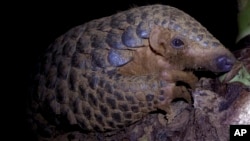Cameroon has burned more than three tons of pangolin skins and scales seized from smugglers and destined for Asian countries. The central African state says by burning the skins of the world's most trafficked mammal and arresting smugglers, it is sending strong signals that Cameroon will no longer be a country where poaching and smuggling run rampant.
Philip Ngole Ngwese, Cameroon's Minister of Forestry and Wildlife says the pangolin skins and scales were seized on three occasions at the Douala and Yaounde international airports. He says seven suspects are answering charges in Cameroon law courts.
He says they have educated the population that although pangolins are good to eat and are in high demand in Asian countries, they are now totally protected and should never be killed. He says all licenses to hunt in Cameroon indicate that pangolins should not be killed. He said pangolins should not be touched and weapons should be taken from pangolin poachers.
Cameroon has decided the mammals, which resemble anteaters and are completely covered in scales, are going to be permanently protected.
Last June, Hong Kong authorities seized 4 tons of Pangolin scales being smuggled from Cameroon to Asian countries.
According to Cameroon wildlife law, anybody arrested or found in possession of parts or the whole of a protected wild animal is presumed to have captured or killed that animal and is liable to a prison term of one to three years and or a 10 million CFA ($ 20,000) maximum fine.
The pangolin specialist group of the IUCN (International Union for Conservation of Nature) reports that since 2012 more than 20,000 kilograms of scales of African pangolins bound for Asia have been seized either in Africa, Asia or Europe.
It is also estimated that more than a million Pangolins have been taken from the wild in the last decade.
Pangolins are under severe threat from criminals supplying China, Vietnam and Malaysia, where the meat is considered a delicacy and their scales are thought to contain ingredients important in traditional medicine.
Last September during the 17th Conference of Parties (CoP17) to the Convention on International Trade in Endangered Species, held in Cape Town, South Africa, countries united to ban international commercial trade in pangolins, said to be the world's most trafficked mammals.






